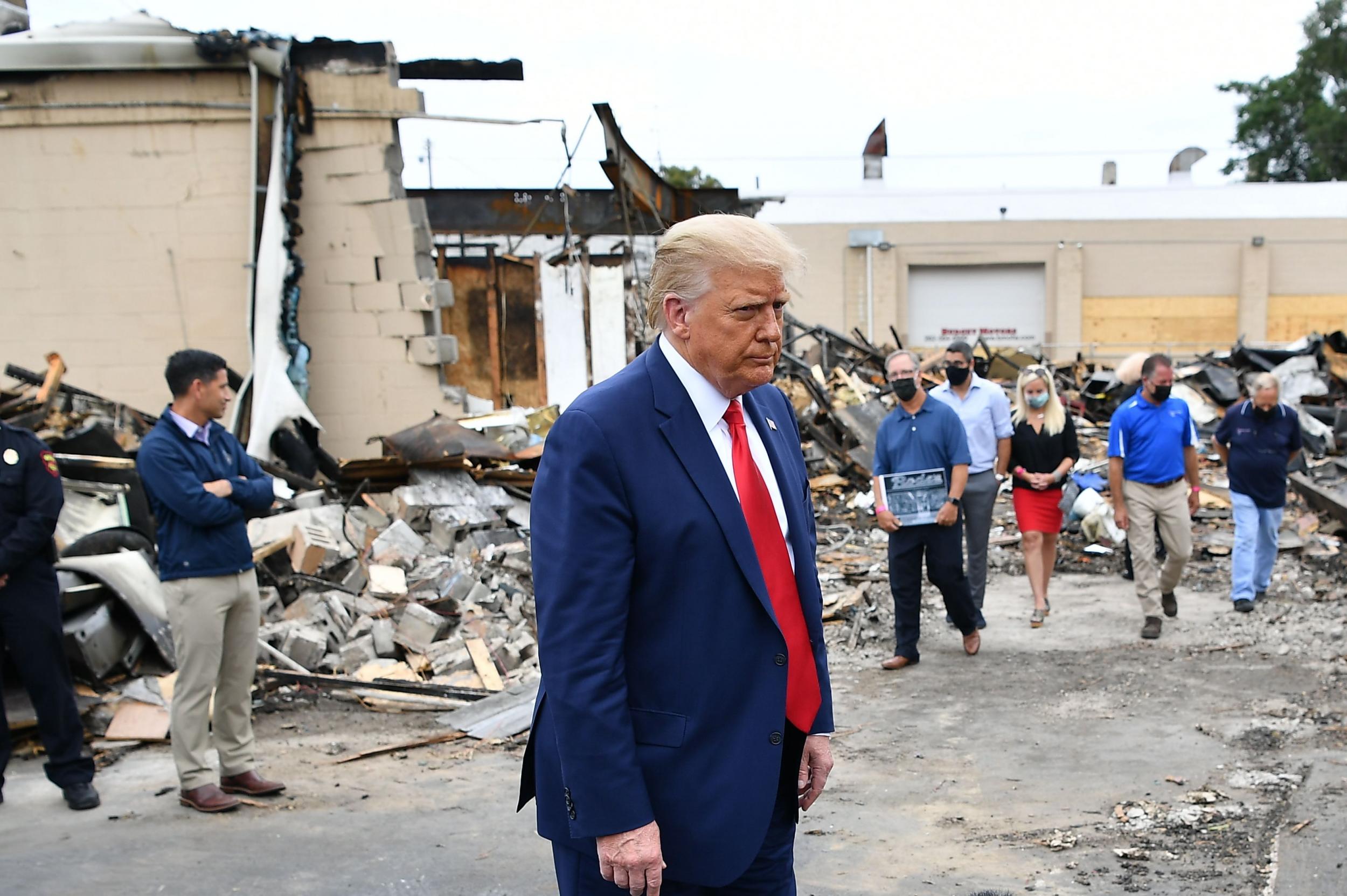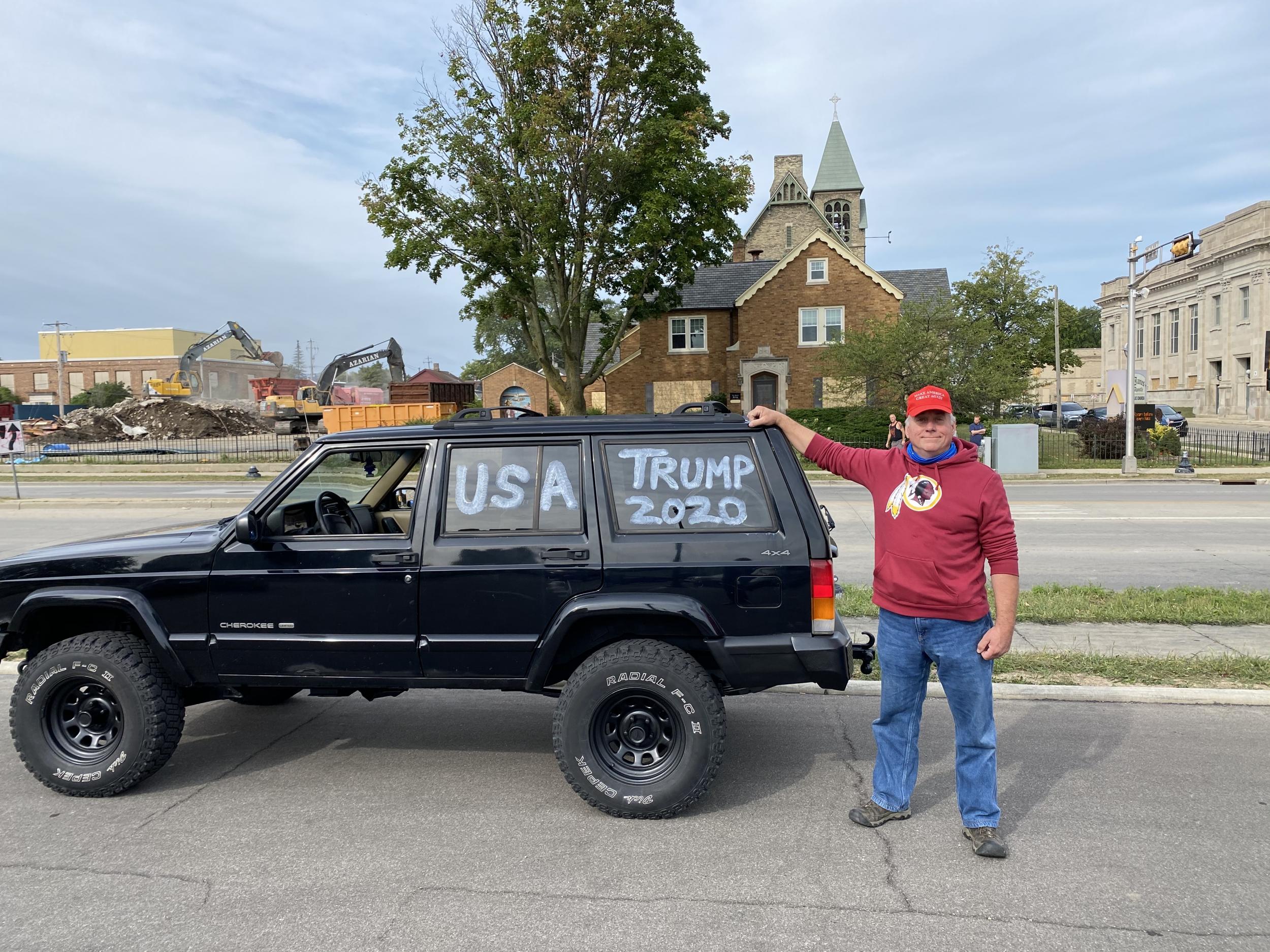Kenosha: A city scarred by protests and killings fears Trump's visit will sow more division
Donald Trump arrived in Kenosha on Tuesday against the wishes of local leaders, who fear it may raise tensions in a city battered by civil unrest
Your support helps us to tell the story
This election is still a dead heat, according to most polls. In a fight with such wafer-thin margins, we need reporters on the ground talking to the people Trump and Harris are courting. Your support allows us to keep sending journalists to the story.
The Independent is trusted by 27 million Americans from across the entire political spectrum every month. Unlike many other quality news outlets, we choose not to lock you out of our reporting and analysis with paywalls. But quality journalism must still be paid for.
Help us keep bring these critical stories to light. Your support makes all the difference.
Kenosha still shows the scars from the battles of the past week. Most downtown buildings are boarded up. Graffiti covers the pavements and walls. Dozens of burnt-out cars sit in a parking lot not far from the courthouse, which is now watched over by National Guard troops.
But a burst of anger following the police shooting of 29-year-old Jacob Blake has given way in recent days to an uneasy calm in this small city on the shores of Lake Michigan. A curfew largely quieted the streets at night. It was a fragile peace that was disturbed by the arrival of Donald Trump on Tuesday.
“It’s going to cause more of a problem,” says Adam Gadzala, a 26-year-old Black Lives Matter supporter, fresh from a shouting match with a group of Trump supporters across the street. “He just wants to claim credit for something that he really didn’t help solve.”
“What we have now is somebody who is orchestrating division and playing on fears of white people. He knows his audience and he knows how to play them well,” he added.
Kenosha has been transformed in the week since the shooting and the protests that followed the 23 August incident. Businesses and buildings were burnt and destroyed by demonstrators. In those same disturbances, a 17-year-old Trump supporter from Illinois is accused of shooting two protesters dead and wounding another– an event that has raised fears of civil strife in America’s cities. He has been charged with six criminal counts, including first-degree intentional homicide.
The shooting and the chaos that followed has placed this city at the centre of that nationwide debate over police violence and the response to it. Mr Trump, it appears, hopes to keep it there.

Months away from an election and trailing decisively in the polls behind his opponent Joe Biden, the president has in recent weeks made law and order the focus of his campaign. He has sought to keep the country’s attention on scenes of violence that have occurred during protests for racial justice across the country. On Tuesday, Kenosha became just the latest backdrop.
“These are not acts of peaceful protest but, really, domestic terror,” Mr Trump said after touring areas damaged by riots, where he was joined by attorney general Bill Barr and acting secretary of homeland security Chad Wolf.
“To stop the political violence, we must also confront the radical ideology. We have to condemn the dangerous anti-police rhetoric,” he added.
The president met with police and business owners affected by the rioting. He also announced that the federal government would make $1 million available to Kenosha law enforcement, and $4 million for small businesses.
Mr Trump was accompanied by crowds of his supporters who came to Kenosha in a show of support – at times engaging in back-and-forth arguments with racial justice protesters in the main square.
Dan Cox, a 56-year-old plumber, who came from nearby Libertyville, said he was angered by the scenes of destruction he was seeing on television.
“I think he can bring attention to what is going on,” he said, standing in front of his car with the words “Trump 2020” spray painted on the side.
“Currently there seems to be a lot of downplaying of what’s happening in places like Kenosha. What I’m seeing here is not protesting. It is violence, it is mayhem. It is burning and looting,” he added.

But there were plenty who didn’t want the president to come. Wisconsin’s governor, Tony Evers, was among a host of local leaders who asked Mr Trump to reconsider. In a letter, he said a visit at this time “will only hinder our healing” and “delay our work to overcome division and move forward together”.
As crowds of Trump supporters and protesters faced each other in the city’s main square throughout the day, it appeared that healing had indeed been disrupted.
“If he was coming to Kenosha to really talk about the situation, and he really felt bad about the situation, why didn’t he tell his supporters to stay behind? Don’t come. This ain’t about y’all,” said Jamarcus Blaze, a 34-year-old Kenosha resident.
“This is not about politics right now. This is about people who want change,” he added.
The White House said ahead of the visit that they had reached out to Mr Blake’s family to arrange a meeting, which they had declined. During his visit, Mr Trump said he felt “terribly” for his family.
But they were keen to stay away from the political fray, and instead held what was billed as a community rebuilding event at the intersection where Mr Blake was shot seven times in the back.
“We’re no longer going to tolerate this. As a community, we’re gonna work together. We’re gonna put to the side our differences. We’re gonna agree to disagree, and we’re gonna rebuild our community,” said his uncle, Justin Blake, at the event.

To Mr Trump’s critics, the visit was indicative of a strategy to provoke divisions and raise the spectre of chaos in American cities in order to secure re-election.
Mr Biden, speaking one day ahead of the president’s visit to Kenosha, called his opponent “an incumbent president who makes things worse, not better. An incumbent president who sows chaos rather than providing order.”
Those claims come amid a number of events of the past week that have stoked fears of civil unrest and violence across the country in the run-up to the election.
That was followed in quick succession by an incident in Portland, in which a man associated with a far-right group was fatally shot on Saturday amid clashes between pro-Trump groups and left-wing protesters.
As the crowds began to grow ahead of Mr Trump’s arrival, 16-year-old Angelez Perez, who herself had taken part in the protests over the last few days, feared yet more violence.
“I don’t care what he has to say. It’s not necessary,” she says. “It’s going to make everything worse. Tonight is going to be bad ... There goes the other half of Kenosha.”
Subscribe to Independent Premium to bookmark this article
Want to bookmark your favourite articles and stories to read or reference later? Start your Independent Premium subscription today.

Join our commenting forum
Join thought-provoking conversations, follow other Independent readers and see their replies
Comments